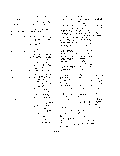 According to Mrs. Linebarger, 'War No.81-Q'
According to Mrs. Linebarger, 'War No.81-Q'
definitely refers to the Instrumentality: "Maybe not the Lords, but the supervisors of mankind had decided that war was senseless. So instead, each side was required to select a combatant, and they fought duels in spaceships.
The title enviously refers to one of the "limited was" and in 'On the Storm Planet' published 37 years later, there is a reference to similar spaceship duels. Linebarger, incidentally later wrote, Poetry under the Anthony Bearden pseudonym -- "volumes and volumes" of it, his
widow states. Some was published in "little" magazines, and even won prizes.. And two Anthony Bearden poems are among the relics Rod McBan finds in the Store of Heart's in 'Old North Australia'.
The genesis of the term "Instrumentality"
as used by Linebarger is uncertain. It may have had something to do with his experiences in China with Communism. His Australian friend of later years, Arthur Burns, recalled in the Australian Science Fiction Review in 1966 that Linebarger had been struck by the manner in which Communism appealed to the "sense of vocation" in man, with its "conviction or historical destiny". There may be a connection between this mystique and that of the Lords of the Instrumentality, with their perpetual concern for the "destination" of mankind. The Lords see themselves as instruments, as it were, of human evolution.
Another' clue may exist in RIA~ in which the heroine, sifting through her memories in search of her identity, experiences toward the end a sort of quasi-religious vision:
"She felt that she stood somewhere in the lower part of her own tremendous skull, and that she listened to the fluent deep roar of a resounding bronze instrument of some kind - something metallic, something which sounded like the instrumentality of man, not like the unplanned noises of nature and the sea," Linebarger's belief in the order and purpose of human existence, as express in RIA, was part of his Episcopalian religious faith. Yet, until 1960, his fiction contained no explJcitl teiigious message.
By the time 'War No. 8l-Q' appeared, Chiang Kai-Shek's forces had just completed the reunification of China, So in 1930~ Line-barter cnu~ :l~:~d in the University of Nanking~ Chiang'~ c~:,ital. The same year he went to work as his father's private secretary and, though only 17, negotiated a silver loan for China from the United States.
There was a brief generation gap between father and son, Young Linebarger had developed radical leanings during the period when the Nationalists were still collaborating with the Communists. The elder Linebarger had a simple answer: for his son's 18th birthday, he sent: him on a trip to Russia. A few days
in Leningrad sufficed to cure the son of
any sympathies for Communism. In fact, he was next sent to the United States to propagandize
on Chiang's behalf against the Reds.
Linebarger finished college at George Washington University and in 1933 earned his A.B. degree in political science there. Meanwhile, he continued writing. In 1931, he produced the first draft of 'The Fife of Bodhidharma', which he would rewrite in 1955. The next year, he had a commentary in one of his father's books THE GOSPEL OF CHUNG SHAH.
He translated some Chinese stories, and began keeping notebooks of ideas for stories mostly Chinese, but also science fiction. "Every time he got an idea, he jotted it down," according to his widow[ "It would gel eventually, and he'd write the story very quickly."
Linebarger did post-graduate work at American University and the University of Chicago, but it was at Johns Hopkins University that he obtained his Ph.D in 1936 at the tender age of 23. He then married his first wife, Margaret Snow. Her father, Chester Snow, was later part u[ the Manhattan project at LOS Alamos. Dr. Linebarger dedicated both his Felix C. Forrest novels so her, and she bore him two daughters, Marcia Christine and Johanna Lesley. But in 194g their marriage broke up and ended in divorce. It was the year after that Dr. Linebarger remarried (but more on that later'
Dr. Linebarger had planned t? do postdoctoral work in Germany. But when he visite~3 Berlin in 1936, he was so revolted by the Hitler regime that he immediately left the country, and never returned there until many years after World War II. instead, he took a job as instructor in government at Harvard University. This marked the end of his job as his father's private secretary - but by no means that of his role as spokesman for the Nationalist Chinese cause.
At 23, Dr. Linebarger had already seen more of the world than do most men in a lifetime. He spoke Chinese, German, French and Spanish and could read Russian and Portuguese. His varied experiences had, as Burns pointed out given him a "sharp perception of racial and cultural tural differences~" and "furthered his capacities for coming to know all kinds of men and women and to enter sympathetically into the hearts and minds of subject races."
In 1937, Dr. Linebarger became an instructor in political science at Duke University: within a year, he was assistant professor, Also in ~937, he published the first book of his own, THE POLITICAL DOCTRINES OF SUN YAT SEN. This was followed by GOVERNMENT IN REPUBLICAN C}{INA in 1938 and THE CHINA OF CHIANG KA1-SHEK in 1941. He also wrote the introduction to OCEAN MEN a 1937 play by his father that was supposed to be an allegory on Sun Yat Sen's revolution
- 6 -
Document scaning and conversion provided by Peter Barker
Updated May 12, 2015. If you have a comment about these web pages please send a note to the Fanac Webmaster. Thank you.